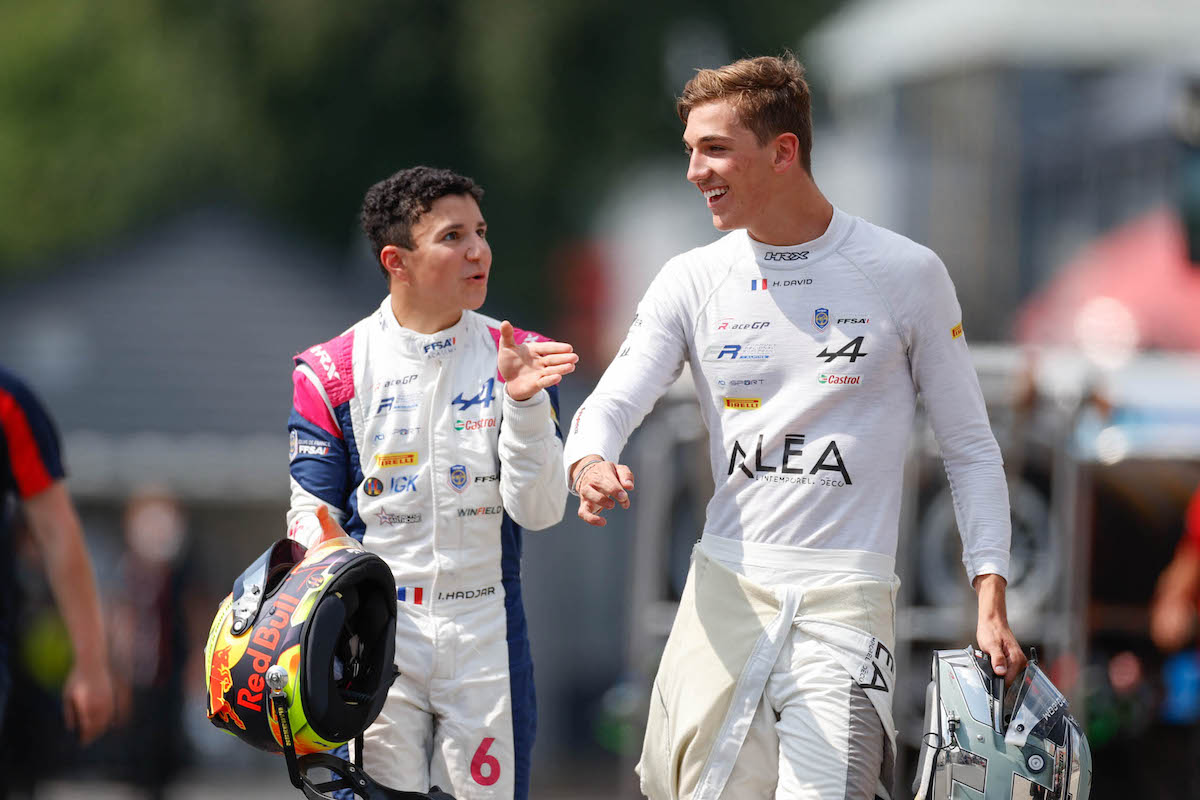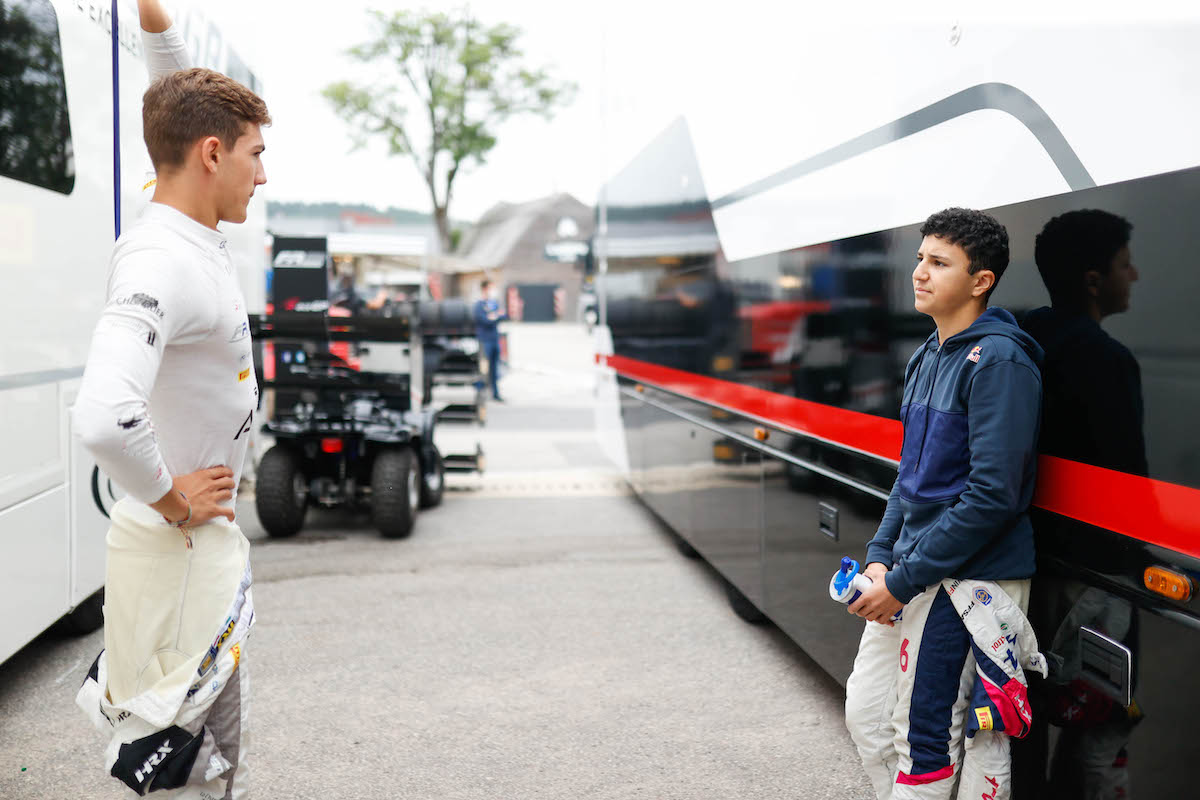
Photos: FRECA
They were closely-matched as Formula Regional team-mates in 2021 and have been friends far longer, but Hadrien David and Isack Hadjar face differing career prospects for 2022 as they tell Roger Gascoigne
The careers of Hadrien David and Isack Hadjar have been closely linked since they began racing karts together in France in 2014. But while David is a Formula 4 champion, it is Hadjar, seven months his junior, whose career now appears to be in the ascendancy.
After bouncing back from a disappointing 2020 to be runner-up in the Formula Regional European Championship by Alpine last year, a lack of budget means David is currently set for another year in the series, while Hadjar has already secured a seat in FIA Formula 3 and a yet-to-be-confirmed membership of the Red Bull Junior Team for 2022.
Formula Scout caught up with the two 17-year-olds to discuss their rivalry, their 2021 seasons and their future plans.
David laughs when asked whether there is any special tension in the relationship with his compatriot and 2021 R-ace GP team-mate. “No, I feel I have a very good relationship with Isack. We have driven together since our first race in karting as kids, so I have known him for seven years now. And we are friends. I mean, I’m always happy to finish in front of him. Being on the podium together is probably [one of] my best memories of the season.”
Hadjar agrees: “Yeah, [though we are friends] I always want to beat him. But it rarely happened this year.”
They shared the podium in both races of the final round at Monza, with David winning race one and Hadjar taking race two. It was the second win of the season for both, as Hadjar won on the streets of Monaco and David inherited victory at Paul Ricard.
Hadjar acknowledges his team-mate’s strong performances, particularly in qualifying. David had an average grid spot of 6.20, lowered by not being able to set a representative lap in Q1 at Barcelona and having to start from 34th place, while FRegional rookie Hadjar’s was 8.25. He was in the top two in qualifying twice, while David was on the front row five times.
“I’ve been outqualified by Hadrien quite a lot of times, he’s very impressive in qualifying sessions,” said Hadjar.

“He’s more experienced, he’s more, I won’t say smarter, but he knows how to deal with this kind of stuff [qualifying up the order despite pace struggles] better than me. And it made the difference.”
In FREC, with overtaking all but impossible, “what’s important is just to find the extra pace in qualifying” says David. Over the course of 2021, he managed to do that regularly. On average he was the second fastest qualifier, just 0.18% slower than dominant champion and eight-time polesitter Gregoire Saucy when both are compared to the season-long absolute pace.
However, he still recognises how Hadjar has, in turn, helped him develop: “For sure I learned a lot from my team-mates. Isack is a very good driver, especially in the qualifying he has very good pace”.
The Monza weekend earned David enough points to hold off Paul Aron for second place in the championship, and helped Hadjar ease to the rookie classification title. Despite these successes both expected more from the year.
“It was a good season, not a great season,” David admits. “Good because I was always consistent. I think I was the most consistent driver through the season. Even when I was struggling in some meetings like Mugello, I was able to come P6.”
Besides Monza, David was victorious in race one at home at Paul Ricard. But it was his performance in race two which showed his speed, racecraft and willingness to be aggressive. Starting from the pitlane after stalling on the grid, he scythed through the field from last to finish 10th.
“It was very strong, coming from P35 to P8. I think it was a very good race,” he smiles. “Paul Ricard is a low-downforce track and I like [being] in sixth gear and pushing the limits.”
The combative Hadjar is “not very happy with my performance this year” though: “I had a good first half [of the season] and then completely messed up. I learned a lot. But I’m not mature enough at the moment.”

So where does he think he’s been losing out? “Putting everything together. I always miss something which fucks up my qualifying session. In some rounds, we did a step back performance-wise, which didn’t help. But the problem is that when the car was there, I wasn’t there. I’ve made mistakes when the car was performing, and that’s the real problem.”
R-ace had a performance advantage this year with pretty much a full-time line-up of four cars, then a fifth car for the final two rounds to pool data from. Its rivals meanwhile were capped at three points-scoring entries, unless a woman was driving the fourth car, but KIC Motorsport and G4 Racing only reached three cars for four rounds, JD Motorsport for half of the season, Monolite Racing was down to one car by the season finale and DR Formula was in that position half of the time. The only other teams to reach four cars were MP Motorsport and FA Racing, and both only with end-of-season guest entries.
The larger line-up helped Hadjar learn, and for his lights-to-flag Monaco win there was no mystery where his speed came from:
“Because it’s a driver’s circuit. That’s it. But to set up a good car is part of the driver’s work. If you don’t have the car to perform, it’s also because you don’t give the right feedback. It’s not only up to the team to make you a good car and you just drive. You need to work and understand.”
Taking it back by almost two years, David came into 2020 on a high. He had followed up considerable karting success at home with six wins out of eight starts in Formula 4 South East Asia and the French F4 title aged 15. The latter success meant he got signed up by the Alpine Academy (branded by Renault at the time) and a Formula Renault Eurocup seat with MP Motorsport. But 12 months later, a season with a single podium led to him being dropped by the Formula 1 team.
Being at R-ace has made a huge difference for himself and Hadjar. For David, it has been “a completely different atmosphere” compared to MP.
“I feel very good with the team. I live only 15 minutes away from the workshop and have a very good relationship with my engineers. I love the team and I feel very good there,” he says.
 “I learned a lot from my team-mates. I really had to improve my driving style. It was the biggest improvement this year compared to last season and that’s why I am more competitive as well.”
“I learned a lot from my team-mates. I really had to improve my driving style. It was the biggest improvement this year compared to last season and that’s why I am more competitive as well.”
While ART Grand Prix’s Saucy steps up to F3, and is set to be followed by David’s R-ace team-mate Zane Maloney (Trident) and Hadjar (Hitech GP), there will be no move up a category for the title runner-up despite talks of new backing within F1.
“Honestly, I don’t think I will go to FIA F3. It’s impossible budget-wise, I don’t have at all the money,” David explains.
“F3 is way too expensive. I’ll probably do another season in FREC to try to win the title because without the prize money it would be impossible to move up. I don’t know with which team. I feel very good in R-ace but it will depend on the budget.”
And if he does stay with R-ace, will he aim to be dominating the series? “Exactly, this is the target.”
Both drivers are members of the French federation FFSA’s roster of drivers forming a national team, and the support was essential in actually getting David on the 2021 FREC grid and in continuing his racing career into this year.
The contrast with Hadjar is striking. The young Parisian gives the impression of a man in a hurry to move on and up. He told Formula Scout that he already has a signed contract for the 2022 F3 season in his pocket. Though he is unwilling to divulge the name of the team, he drove for Hitech on all three days of post-season testing at Valencia’s Ricardo Tormo circuit.
In addition, Red Bull could announce soon that he is the latest member of its Junior Team, and the confirmation of his F3 programme would likely come with it. It’s been a rather messy ‘is he, isn’t he’ handling so far of Hadjar’s Red Bull status, but he’s not shy in saying that “it’s been official since mid-season” and proudly races with a Red Bull-sponsored helmet.
 From their start in karting, the careers of David and Hadjar followed similar paths, although while David was collecting a succession of national titles, Hadjar was always impatient to move to the next level. They competed in cadet karting together in 2014, when David was fifth in the French championship for 60cc Minime karts. He won the French Cup the next year, while Hadjar was seventh in the French Cadet championship.
From their start in karting, the careers of David and Hadjar followed similar paths, although while David was collecting a succession of national titles, Hadjar was always impatient to move to the next level. They competed in cadet karting together in 2014, when David was fifth in the French championship for 60cc Minime karts. He won the French Cup the next year, while Hadjar was seventh in the French Cadet championship.
David won the Cadet title in 2016, and beat Hadjar to the French Cup. He was the better of the two when they stepped up to OK-Junior karts as well. When they debuted in French F4 three years ago, David won seven races and claimed 14 podiums while Hadjar came second in the separate Junior classification as he was still 14, but did take an overall win at Spa-Francorchamps.
En route to the title, David established a strong rapport with his race engineer, who moved subsequently to R-ace, and really enjoyed the atmosphere of the centrally-run championship. Hadjar, on reflection, concedes “I was too young” to race in 2019.
“I just needed to learn and to learn everything to then fight for the title the next year but that didn’t happen because of the two experienced Japanese [Ayumu Iwasa and Ren Sato],” Hadjar says. “[But] I learned a lot and it was a fun year.”
French motorsport appears on the verge of a new golden age, as Theo Pourchaire, Victor Martins and Clement Novalak have established themselves in Formula 2 and F3. David and Hadjar are looking to make the same impact in F1’s support paddock, even if only one of them might get there this year.